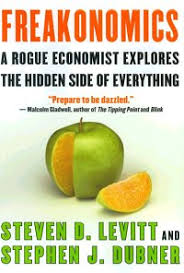Yes, it identifies you. But more importantly, it identifies you apart from other people. While you may share the same name with another person, it is still truly yours.
 In the original Freakonomics, Levitt and Dubner (sorry to keep bringing them up) discuss how name choice effects the likes of personality, success, and impressions. As you may expect, there are a lot of correlation vs. causation issues that go on with this kind of research. However, while a name alone may not effect who one becomes as a person, a name can play a significant impact on the way one is viewed by others. Similarly, a less common name can be a big negative factor in job interviews. As in standard Freak fashion, the economists deconstruct the entire issue, exposing social structure and socio-economic issues to complicate the apparently simple concept of a name.
In the original Freakonomics, Levitt and Dubner (sorry to keep bringing them up) discuss how name choice effects the likes of personality, success, and impressions. As you may expect, there are a lot of correlation vs. causation issues that go on with this kind of research. However, while a name alone may not effect who one becomes as a person, a name can play a significant impact on the way one is viewed by others. Similarly, a less common name can be a big negative factor in job interviews. As in standard Freak fashion, the economists deconstruct the entire issue, exposing social structure and socio-economic issues to complicate the apparently simple concept of a name.
 In the epic and fascinating work A History of God, Karen Armstrong describes the meaning of a name in a different way. In biblical times, knowing someone's name not only allowed you to identify them, but also provided a sense of power over them. In a sense, you held some ownership over that person, and could control them. There are many sources to confirm this idea, but the blaring example is the text from Genesis that identifies God's name as an unpronounceable word.
In the epic and fascinating work A History of God, Karen Armstrong describes the meaning of a name in a different way. In biblical times, knowing someone's name not only allowed you to identify them, but also provided a sense of power over them. In a sense, you held some ownership over that person, and could control them. There are many sources to confirm this idea, but the blaring example is the text from Genesis that identifies God's name as an unpronounceable word.
When you think about it, Armstrong's hypothesis still holds true today. If you don't know somebody's name, how can you request their attention, or ask them a favor, or even address them? It may not give you power over them in a literal sense of the word. However without the name, you are at a disadvantage (why do you think my name on this blog is "The Sub"? :-).
One of my biggest challenges substitute teaching this year is playing the name game. As subs, we find a variety of different tricks to address our students (unfortunately a very common one is "guys"). However, nothing is really as good as simply knowing somebody's name. When you have over 100 students come through the door through the course of the day, this becomes extremely difficult.
Here is what I have found that helps my process:
- Simplify - I don't try and remember everyone's name. However, I do pick out a couple of students and work to make their name stick. By addressing 4 or 5 students by name, it can give off the impression that I may know a lot more names than I really do.
- If you know it, use it - Some names and faces just stick. If there is a particular student I remember the name of, I address them by name as they enter, leave, and throughout class.
- If you don't know it, don't use it - calling somebody by the wrong name is embarrassing for them and doesn't help my position. Same goes for pronouncing somebody's name incorrectly. I am very cautious of both of these. When I do make this mistake, I correct myself immediately and then make a point to use the name correctly within the class period.
- Not spread too thin - so far I've only subbed at a couple schools and couple departments. This means I get a lot of the same students. Aside from the other major advantages this provides, remembering names is a big one.
I hope this helps some others playing the name game.
Q. What do you do to address students in a new class, school, etc., when you don't know names? Do you have techniques to learn names quickly and accurately?
I invite you to contribute by sending in questions, personal stories, thoughts, and articles about substitute teaching. Thanks for stopping by.
No comments:
Post a Comment